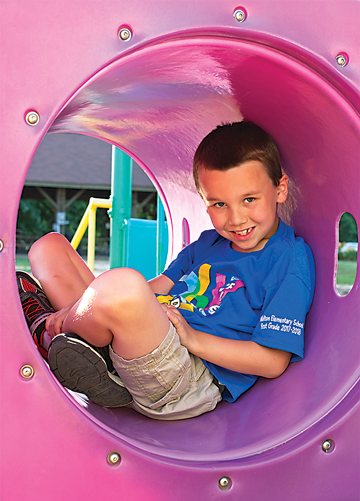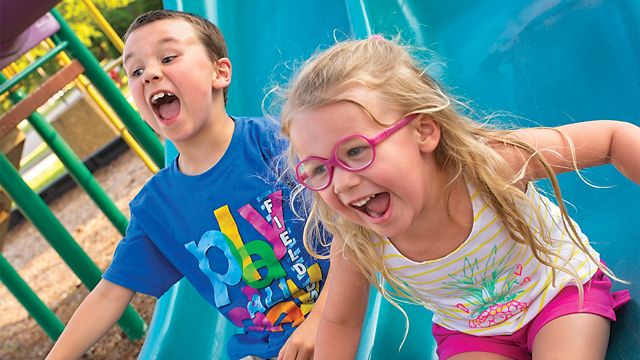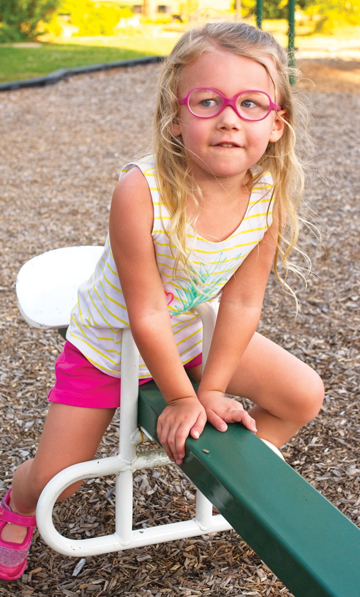My daughter took dance lessons for the first time last year. At three years old, Delaney adjusted well to the routine of class, her new ballet slippers, and interacting with her classmates. She especially adored her dance instructor, Ms. Tara.
After months of driving her to dance class, purchasing her costume, posing for pictures, and preparing for show week, I couldn’t wait to see my daughter perform in her first dance recital. But at dress rehearsal, when the stage lights and music came on, Delaney stood on the stage, rubbed her eyes, and cried for the entire performance.
Sure, I was disappointed. But I also felt really bad for her. She knew her routine perfectly, but she had become paralyzed by stage fright.
In an effort to console her, another parent told Delaney that she had still done a great job. Delaney knew that wasn’t true, though. She looked up at me, teary-eyed, and said, “I didn’t do a great job. I didn’t do my dance.” Then she cried some more.
On the ride home that evening, Delaney and I talked about how scary new experiences can be and how fortunate she was to have two more opportunities to dance the following weekend.
Delaney seemed satisfied with our conversation, and I was inspired to do a better job of building my children’s self-esteem by providing praise that is honest, specific, and appropriate. In other words, why tell a child she did a great job if it’s simply not true? She will see through it, and those words will become meaningless.
Effects of Empty Praise
Chelsi Simmons, a licensed professional counselor in Colonial Heights and mother of three, has encountered similar scenarios in both her personal and professional life. Not too long ago, she was at the playground watching her son, Brantley, race another child. The other child’s parent told Brantley he was “fast as lightning,” and the fastest runner she had ever seen.
Simmons dismissed the comment initially, but in the weeks that followed, she noticed that Brantley was becoming frustrated when playing with other friends. He wasn’t as fast as he thought he should be, as fast as he had been told he was by the well-meaning parent on the playground. His abilities weren’t measuring up to the message he was sent.
“I knew I had to talk with him at that point,” Simmons said. “I told him he was not the fastest runner, but that he could keep practicing, and he could become faster.” He seemed okay with that message.
Simmons works regularly with children and their families on issues of self-esteem and says that it is important for parents to encourage their children’s special skills and focus on improvements. “We should be constantly encouraging our children to become better at whatever it is they are doing and ensuring that they enjoy what they are doing, compared to providing empty praise,” says Simmons.
We’ve all used empty praise. It includes statements like “great job” and “you are fantastic.” This type of praise is often delivered without sincerity, and over time, loses its effectiveness. It can also lead to disappointment and self-esteem issues, and even cause a child to question his skills.
“If a child is constantly told ‘great job,’ and is eventually corrected by other people or natural circumstances, the child may begin questioning his ability in that specific area and that self-doubt can spill over into other categories,” says Simmons. For example, if a child thought he was great at spelling because his parents said so, then is eliminated in the first round of the spelling bee, he may question not only whether or not he is a good speller, but also if he is any good at school in general. “This type of negative self-talk is detrimental in younger children who are starting to find themselves and build their own self-esteem,” says Simmons.
Erika Hahn, a mother and elementary school counselor in Prince George County, is also very conscientious about the messages she sends to her daughter. “As a parent, I am inclined to offer some type of positive affirmation to my daughter when she has done well. I want to encourage her and build her self-confidence. On the other side of that, I also try to give honest feedback. If she hasn’t done something to the best of her ability, I don’t want her to think she has,” Hahn says.
While both women agree that praise should be individualized, they also agree that empty praise is still better for a child in the long run than no praise at all. Hahn has noted the damaging effects of lack of praise in her work as a school counselor.
“I have encountered far too many students who have never gotten the ‘great job’ they are so desperately looking for from a parent,” says Hahn, who notes that this can cause a magnitude of ripple effects for children emotionally: never feeling good enough; not having positive self-esteem; and crying out for attention in the least desirable ways because any attention is better than none at all. “There is definitely a balance that is needed,” adds Hahn.
While children do desire praise, they can also recognize when it’s genuine and when it’s not.
“Your child knows if he is not the first person to cross the finish line or score all of the goals,” says Simmons. “And if we, as parents, tell our children that they did a great job, when in fact, they could have tried harder or played better, then we minimize their internal motivation to improve next time.”
It seems like common sense, really. Why would we provide a child with a blanket Great job! statement when the child truly did not perform well? Perhaps because it’s one of the easiest statements we can offer as parents.
“The lives of parents are extremely busy and filled with work, activities for the kids, and household responsibilities. ‘Great job,’ unfortunately, has become as commonplace as the phrase ‘How are you?’ when you greet someone,” Simmons says. “You do genuinely care, but at times, we are so busy that it is easy to send a simple praise compared to an individualized praise.”
Instead of offering empty praise, experts recommend commenting on your child’s special skills, encouraging children to become better, and focusing on improvement.
“We need to provide genuine, person-centered, strength-based praise, and enable our children to have discussions on areas of weakness and strive to improve those areas,” Simmons says. “It is more important that our children are the best they can be on the inside, compared to placing that emphasis on external factors.”

Erika Hahn agrees and believes that specific, meaningful praise is critical to the development of a child’s self-esteem.
“If we encourage kids to do the best they can in a situation, then they can learn to intrinsically encourage themselves. They will know when they’ve tried their best and they will be proud of themselves. Kids need to learn that their validation can’t come from other people; they have to find it in themselves,” says Hahn.˘
Ask the Right Questions
So what should a parent say when a child asks for feedback when he has obviously not done a great job? This was my reality last fall when my son, Evan, played an entire soccer game without getting near the ball. It was early in the season, he was new to the sport, and he just seemed afraid. As other children ran aggressively toward the ball, Evan backed away and adjusted his shin guards. Then, after the game, he asked me how he did.
In response, I asked him how he thought he had performed. “How do you think you did?”
“Well, I was pretty nervous,” Evan admitted. “And the ball seemed like it might hurt if it came toward me fast,” he added.
We then turned the conversation toward specific things he did well and specific things he could improve on the next time. We discussed the fact that he ran quickly and was able to keep up with his teammates, even though they were older. We also made a plan to practice more aggressively at home, so he could see that the ball wouldn’t hurt too much and he didn’t need to be afraid of it. It was a productive, meaningful conversation, and one that wouldn’t have happened if I had answered, “You did great!” to his question.

Simmons says turning the question back to the child is a wonderful strategy. “Being able to self-critique is a valuable skill,” she says. “I recommend asking the child how he thinks he did, along with asking whether or not he had fun.”
Fun! Can you imagine that? We are talking about children, after all. But because we live in such a competitive and driven society, we often forget about the importance of doing things just for fun. As a result, our children do, too. We don’t have to be great at activities in order to enjoy them. What’s wrong with doing something just because you like it? Isn’t that the point of a hobby?
Most adults are not great. Most of us are average. We are average runners, golfers, and swimmers. We have reached a point in our lives where we know we can’t all be great at everything, but we can develop and improve our skills. If we communicate this to our children, we will run a much lower risk of setting them up for a dissatisfied life.
What’s in a Mindset?
Sandy Correll, a certified school psychologist from Prince George, reminded me about Carol Dweck’s research on mindset. More than thirty years ago, Dweck, a psychologist and professor at Stanford University, coined the terms fixed mindset and growth mindset. Dweck’s research suggests that whether people are aware of it or not, most of us have certain mindsets about ourselves as good teachers, bad parents, lousy athletes, etc. Additionally, individuals with fixed mindsets often believe that talent and intelligence are fixed traits and they tend to shy away from activities that challenge them. Individuals with a growth mindset, however, believe their skills and abilities can be developed through hard work. But perhaps the most important aspect of her research is the conclusion that it is possible to change a person’s mindset from fixed to growth, and when we do, the result is increased motivation and achievement.
 “Understanding that our brains stretch and grow, and that we develop parts of ourselves when we tackle difficult tasks and embrace challenges is central to the growth mindset approach. This approach also recognizes that making mistakes is just a consequence of working hard and trying new things, and it creates opportunities for learning,” says Correll.
“Understanding that our brains stretch and grow, and that we develop parts of ourselves when we tackle difficult tasks and embrace challenges is central to the growth mindset approach. This approach also recognizes that making mistakes is just a consequence of working hard and trying new things, and it creates opportunities for learning,” says Correll.
In order to steer children toward developing a growth mindset, it is important for praise to be specific. It is also important for it to be attached to the process and not to the child.
For example, instead of saying, “Great job!” we can tell a child that it is obvious he practiced a lot. Instead of “You’re a good girl,” we can say, “I appreciate that you took out the trash without being asked.” Instead of, “You are really smart,” we can say, “You have been working hard in math, and you have improved.”
When a child challenges himself and still doesn’t perform well, Correll suggests complimenting the effort and working with the child to figure out what he doesn’t understand. “You could also tell the child that everyone learns in a different way, and you will keep trying to find the way that works best for him,” Correll says.
Parenting children toward a growth mindset is invaluable for everyone involved. The ultimate goal is to raise a child who exhibits confidence, accepts criticism, and fails without giving up. And the best way for us to do that is to walk the walk, alongside our children. We can effectively influence a growth mindset in others when we are also cultivating one in ourselves.
As for my dancing daughter, she recently completed her second year of ballet and tap and performed in her recital without the least bit of stage fright. It was wonderful to see how proud she was of her own efforts and progress. It was even more delightful to see her having so much fun. I know that together we will experience many more moments of success and failure, and we will do our best to learn and grow from each of them.





